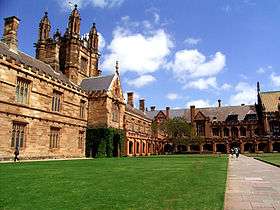St Paul's College, University of Sydney
St Paul's College is an Anglican residential college which is affiliated with the University of Sydney in Sydney, Australia. Founded in 1856 by an 1854 act of the New South Wales Legislative Council, it is Australia's oldest university college. St Paul's is familiarly referred to as "Paul's", its residents as "Paulines" and its alumni as "Old Paulines". Alumni include prime ministers, deputy prime ministers, federal and state government ministers, High Court of Australia justices, Court of Appeal presidents and justices, Supreme Court chief justices and justices, pioneering surgeons and physicists, Australian of the Year recipients and 29 Rhodes Scholars.
| St Paul's College | ||||||||||
|---|---|---|---|---|---|---|---|---|---|---|
| The University of Sydney | ||||||||||
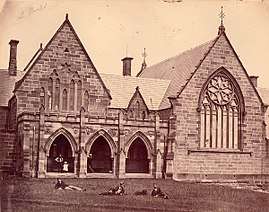 Common room and dining hall, photographed from the main quadrangle in the 1870s | ||||||||||
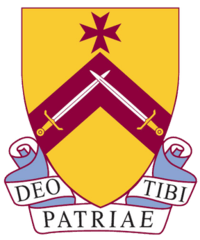 | ||||||||||
| Location | 9 City Road, Camperdown, City of Sydney, New South Wales, Australia | |||||||||
| Coordinates | 33°53′24″S 151°11′15″E | |||||||||
| Full name | St Paul's College | |||||||||
| Motto | Deo Patriae Tibi (Latin) | |||||||||
| Motto in English | "For God, Country and Thyself" | |||||||||
| Established | 1856 | |||||||||
| Named for | Paul the Apostle | |||||||||
| Gender | Male only for undergraduates, co-educational for postgraduates | |||||||||
| Warden | Reverend Dr Ed Loane | |||||||||
| Residents | 400 | |||||||||
| Undergraduates | 260 | |||||||||
| Postgraduates | 140 | |||||||||
| Senior tutor | Mr Philip Barr | |||||||||
| Called | Paulines | |||||||||
| Website | stpauls | |||||||||
| St Paul's College | ||||||||||
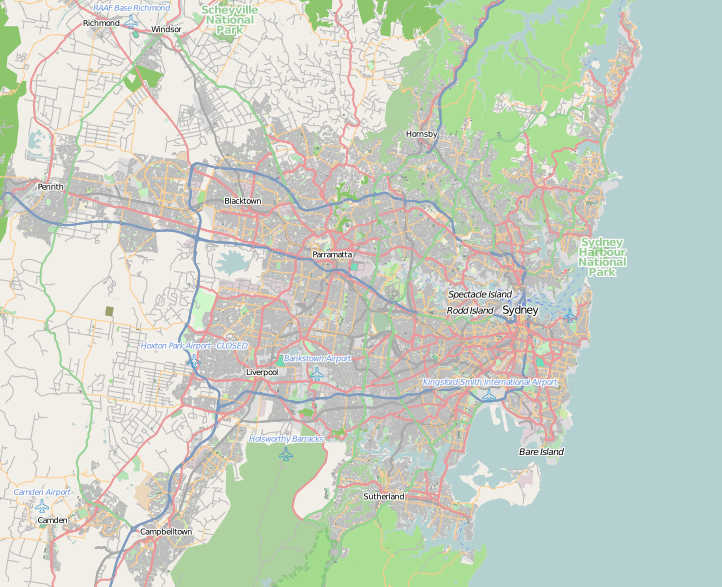 Location in greater Sydney | ||||||||||
Building details | ||||||||||
| General information | ||||||||||
| Architectural style |
| |||||||||
| Technical details | ||||||||||
| Material |
| |||||||||
| Design and construction | ||||||||||
| Architect |
| |||||||||
| Renovating team | ||||||||||
| Renovating firm | Stephenson & Turner (1947) | |||||||||
New South Wales Heritage Database (Local Government Register) | ||||||||||
| Official name | St Paul's College Group, University of Sydney | |||||||||
| Type | Local environment plan | |||||||||
| Designated | 14 December 2012 | |||||||||
| Reference no. | I52 | |||||||||
| Type | Built | |||||||||
| Category | Other | |||||||||
The college has nearly 360 residents, of whom about 260 are undergraduate men; the remainder are postgraduate women and men undertaking further study or holding university positions.[1] In 2019, the college opened its modern "Graduate House" community with rooms for an additional 140 postgraduate students and university academics.[2] It retains most of its original 7-hectare (18-acre) grant and has its own oval.
History
St Paul's was the first university college in Australia.[3] Its development followed an unsuccessful attempt by members of the Anglican Church to incorporate the earlier St James's College within the new University of Sydney, and was led by Sir Alfred Stephen (Chief Justice of the Supreme Court of New South Wales).[4]
The new governing document provides for a college council with 12 fellows, four of whom must be elected Anglican clergy, six elected laymen and two appointed laymen - one of which must be a University of Sydney academic. Fellows serve six-year, renewable terms and are elected by graduates of the college who have spent at least three semesters in residence. The college is an independent body corporate, legally designated as "The Warden and Fellows of St Paul's College".[5]
By this time the college had its own distinct intellectual tradition, foreshadowed by the founders, a liberal Anglicanism which took seriously the challenges involved in combining religious and secular knowledge and in making the English Church useful to the Australian nation. The number of Paulines from this period who are now listed in the Australian Dictionary of Biography is evidence of the way the college was in step with the times.[6]
The original building was designed in Gothic style by English-born architect Edmund Blacket. Blacket was a distinguished ecclesiastical architect; he also designed the main university building and supervised the construction of the Catholic St John's College at the same university.[7][8] Other buildings include a chapel (designed by John Leslie Stephen Mansfield and completed in 1960) and a residential wing designed by Clive Lucas, Stapleton & Partners which opened in 1999.[3]
In November 2009, a Sydney paper reported that several former residents of the college (all players on the same social soccer team)[9] were members of a Facebook group described itself as "pro-rape, anti-consent".[10][11] The group was alleged by the reporter to be part of a broader culture amongst privileged youths which demeaned women in a sexist (or sexually violent) way.[12] Warden Ivan Head issued a public response condemning the students' behaviour.[10][13]
At the 2010 World University Debating Championship two former Paul's students (Chris Croke and Steve Hind) took the title, winning the final against teams from Oxford, Harvard and the London School of Economics.[14] Since the 1890s, the college has fostered social-justice ideals (as part of the liberal Anglican tradition) and most students are involved at some point in philanthropic activities. During the first decade of the 21st century, half the male Rhodes Scholars from Sydney University have been Paulines. In 2010, Jack Manning Bancroft was named NSW Young Australian of the Year for his work in indigenous education.[14][15]
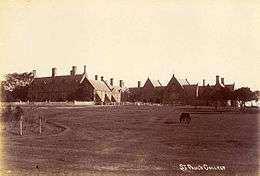
Heraldry
Officially granted by the Earl Marshal in 1961, the college coat of arms displays crossed swords and the Maltese cross to represent St Paul in the official colours of gold and gules. The college's motto, Deo Patriae Tibi, can be translated as "For God, country and yourself."[16]
Academic honours
The college boasts a long list of academic honours and its website lists many University Medallists since 2005.[17] Its Rhodes Scholarship list is given below:
- 1907 – Garnet Vere Portus (1883–1954; in college 1903–04), afterwards cleric, Professor of History and Political Science, University of Adelaide, and radio broadcaster
- 1908 – Richard Granville Waddy (1885–1974; in college 1905–09), afterwards medical practitioner
- 1911 – Hugh Kingsley Ward (1887–1972; in college 1909–10), afterwards Professor of Bacteriology, University of Sydney
- 1915 – Walter Ferguson Crawford (1894–1978; in college 1913–14), afterwards knighted, Governor of Northern Sudan
- 1920 – Vernon Haddon Treatt (1897–1984; in college 1915–16), afterwards knighted, NSW Minister for Justice and Chief Commissioner for the City of Sydney
- 1925 – Allan Robert Callaghan (1903–93; in college 1922–24), afterwards knighted and South Australian Director of Agriculture
- 1931 – David Arthur Garnsey (1909–96; in college 1927–29), afterwards Bishop of Gippsland[18]
- 1935 – Keith Noel Everal Bradfield (1910–2006; in college 1930–33), afterwards OBE and Civil Aviation Advisor to the Government of Papua New Guinea
- 1939 – Walter Laurence Hughes (1917–99; in college 1934–38), afterwards Kt, head of an engineering and shipbuilding firm and government adviser
- 1940 – Basil Holmes Travers (1919–98; in college 1938–39), afterwards Headmaster of Shore
- 1946 – William Winslow Woodward (1920–87; in college 1939–40), afterwards medical practitioner
- 1948 – Louis Walter Davies (1923–2001; in college 1941), afterwards AO and Professor of Electrical Engineering, University of NSW
- 1951 – Adrian Peter Henchman (1927–89; in college 1946–50), afterwards Sydney solicitor
- 1953 – James Graham McLeod (b 1932; in college 1949–53), afterwards AO and Professor of Neurology, Sydney University
- 1956 – John Maxwell Bailey (b 1935; in college 1954), afterwards attached to the European Atomic Energy Commission, Geneva
- 1960 – Malcolm John Swinburn (b 1937; in college 1956–60), afterwards a medical practitioner
- 1961 – Peter Garnsey (b 1938; in college 1956–60), afterwards Professor of the History of Classical Antiquity, Cambridge, and Fellow of Jesus College
- 1964 – John Dyson Heydon (b 1943; in college 1960–64), afterwards AC and High Court justice
- 1975 – Peter Edward King (b 1952; in college 1971–75), afterwards Sydney barrister and Federal MP
- 1990 – Andrew Scott Bell (b 1966; in college 1985–89), afterwards Sydney barrister (SC)
- 1992 – Scott Nixon (b 1968; in college 1986–91), afterwards Sydney barrister
- 1995 – Peter Raymond Barnett (b 1971; in college 1990–94), afterwards London barrister
- 2001 – Andrew Henry Charlton (b 1978; in college 1997–99), afterwards Director of AlphaBeta
- 2003 – Benjamin Juratowitch (b 1978; in college 1998), afterwards Paris barrister (QC)
- 2007 – Eric Ronald Wing-Fai Knight (b 1983; in college 2002–04), afterwards Associate Professor and Pro-Vice-Chancellor (Research, Enterprise and Engagement), University of Sydney
- 2009 – Nikolas Norman Patrick Kirby (b 1984; in college 2005–09), afterwards Research Fellow in Philosophy and Public Policy, Blavatnik School of Government, Oxford
- 2010 – David Colin Conway Llewellyn (b 1985; in college 2006–09), afterwards CEO of the Good Lad Initiative and DJS Antibodies
- 2011 – Nathaniel Jon Ware (b 1988; in college 2009–11), afterwards social impact economist
- 2013 – Patrick Harry Brian Bateman (b 1987; in college 2006-10), afterwards management consultant and policy adviser
Wardens
The following individuals have served as Warden of St Paul's College:
| Ordinal | Officeholder | Term start | Term end | Time in office | Notes |
|---|---|---|---|---|---|
| 1 | The Revd Henry Judge Hose | 1856 | 1862 | 5–6 years | |
| 2 | The Revd William Henry Savigny | 1862 | 1865 | 2–3 years | |
| 3 | The Revd William Scott | 1865 | 1877 | 11–12 years | Former NSW government astronomer |
| 4 | The Revd Canon William Hey Sharp | 1878 | 1908 | 29–30 years | |
| 5 | The Revd Lewis Bostock Radford | 1909 | 1915 | 5–6 years | Afterwards Bishop of Goulburn |
| 6 | The Revd Canon Arthur Henry Garnsey | 1916 | 1944 | 27–28 years | |
| 7 | The Revd Felix Raymond Arnott | 1946 | 1963 | 16–17 years | Afterwards Archbishop of Brisbane |
| 8 | The Revd Canon Alexander Peter Bruce Bennie | 1964 | 1985 | 20–21 years | |
| 9 | The Right Revd Maxwell McNee Thomas | 1985 | 1994 | 8–9 years | Former Bishop of Wangaratta |
| 10 | The Revd Canon Ivan Francis Head | 1994 | 2017 | 22–23 years | |
| 11 | Dr Donald John Markwell | 2018 | 2019 | 1–2 years | Former Warden of Rhodes House, Oxford |
| 12 | The Revd Dr Edward Loane | 2020 | years |
Controversy
In 2009 a "pro-rape" Facebook page was formed by a group of past and present St Paul's students.[19] The page ("Define Statutory") described itself as "anti-consent". For this, the students of St Paul's received the 2009 Ernie Awards for sexist behaviour.
In June 2012, an article critical of one of St Paul's dinner events appeared in a local Australian newspaper. The controversy was over an event with the theme "End of the British Raj". When the college students arrived in the dress code ("white tie or colonial uniform"), they were met by the usual college catering staff, of Indian and south Asian descent, dressed in colourful traditional cultural garments[20] following which the university student newspaper protested against it in a letter, "British Raj beyond bad taste".[21] On 6 June 2012, the University Student Representative Council passed a motion condemning the themed party by writing a letter to the college's spokesman and the warden asking for an explanation. Later, many Indian media groups covered this news with copies of the original Sydney Morning Herald article.[22][23][24]
Allegations of systemic sexism and misogyny surfaced again in 2017 following a post on the College's Facebook page which compared women to "harpooned whales". The college had refused to participate in a University-wide review into culture led by Elizabeth Broderick.[25] Michael Spence, the Vice-Chancellor of the University of Sydney raised concerns regarding the "deep contempt for women" and the "cultural problems" at the college. In June 2017 Ivan Head, the Warden of the College, who had been in the role for 22 years, retired amid concerns regarding his leadership.[26]
Appearing on 60 Minutes in July 2017, the parents of Stuart Kelly, the brother of one-punch attack victim Thomas Kelly who committed suicide in 2016, stated that Kelly had been subjected to hazing and bullying at the college. Kathy Kelly stated "He went off to university at Sydney, for one night at a college, and he came home a different person the following day ... He was broken."[27]
Again the college came in for sustained criticism after the release of "The Red Zone" report by Nina Funnell on 26 February 2017.[28] Reportedly, some rituals allegedly involved male students at Sydney University's residential colleges masturbating into shampoo bottles belonging to female students and defecating in hallways.[28] In particular, Funnell called for the criminalisation of hazing rituals at colleges like St Paul's. Her call for the criminalisation of that conduct follows public comments by Kathy and Ralph Kelly that they believe their son, Stuart Kelly, committed suicide as a result of hazing rituals at the college in 2016.[29] In response, Spence said the University would support a coronial inquest into Stuart's death.[29] Following Broderick's review into College Culture at the University of Sydney's Colleges, St Paul's released a response in which it indicated it would address all recommendations.[30]
Alumni
Gallery
 Main courtyard
Main courtyard Chapel
Chapel
References
- "History". St Paul's College. Retrieved 26 May 2010.
- "Graduate House". St Paul's College. Retrieved 6 September 2018.
- Waldren, Murray (13 September 1999). "No hidden a gender, it's taking wing". The Australian. p. 7.
- "History". St Paul's College. Archived from the original on 21 July 2012. Retrieved 12 November 2009.
- "St Paul's College Act (1854) - Section 1". Retrieved 7 January 2017.
- Hamish Milne, The Origins of St Paul's College (BA thesis, University of Sydney 1995) and St Paul's College: Another Fifty Years, 1900–1950 (MPhil thesis, University of Sydney 1997).
- Yates, Skye (8 March 2002). "Inner-city church to inspire". Daily Telegraph. Sydney, Australia. p. 113.
- Ham, Melinda (30 October 2008). "Secrets of the city exposed – architecture". The Sydney Morning Herald. p. 17.
- Richard Ackland (13 November 2009). "St Paul's shames uni, church". The Sydney Morning Herald. Fairfax Digital. Retrieved 16 November 2009.
- "Pro-rape Facebook group condemned". Australian Broadcasting Corporation. 9 November 2009. Retrieved 11 November 2009.
- Ivan Head (9 November 2009). "Dr Ivan Head responds to St Paul's College students' Facebook rape page scandal". News Corporation. Retrieved 11 November 2009.
- Ruth Pollard (9 November 2009). "Elite college students proud of 'pro-rape' Facebook page". The Sydney Morning Herald. Fairfax Digital. Retrieved 11 November 2009.
- Ivan Head (9 November 2009). "Dr Ivan Head responds to St Paul's College students' Facebook rape page scandal". news.com.au. News Limited. Retrieved 11 November 2009.
- "News and Events". St Paul's College. Archived from the original on 25 December 2009. Retrieved 18 January 2010.
- "Australian of the Year Awards: New South Wales National Finalists 2010". Australian of the Year Awards. Archived from the original on 16 July 2011. Retrieved 18 January 2010.
- "St. Paul's College". Heraldry. University of Sydney. Retrieved 12 November 2009.
- "St Paul's College University Medallists since 2005". Archived from the original on 22 March 2012. Retrieved 12 June 2012.
- Diocesan history Archived 13 September 2009 at the Wayback Machine
- "Elite college students proud of 'pro-rape' Facebook page". The Sydney Morning Herald. 8 November 2009.
- "Was this uni Raj night racist?".
- "Letters" (PDF). Honisoit. Students' Representative Council: 3. 30 May 2012. Archived from the original (PDF) on 14 May 2013. Retrieved 28 May 2017.
- "Australian college accused of racism".
- "Australian college accused of racism over 'colonial-themed' party". The Times of India.
- "Australian College Accused of Racism Over Colonial-Themed Party". Archived from the original on 16 June 2012.
- "St Paul's College boycotting Elizabeth Broderick review into college culture". smh.com.au. Retrieved 15 July 2017.
- "Warden and chairman at University of Sydney's St Paul's college retire after latest scandal". The Sydney Morning Herald. Retrieved 15 July 2017.
- "Abuse led to Stuart Kelly's death: parents". skynews.com.au. Retrieved 15 July 2017.
- "Shocking college hazing rituals at prestigious Australian university reveal in report". ABC News. Australia. Retrieved 26 February 2018.
- "Thomas Kelly's family calls for 'horrific drunken rituals' to be outlawed after death of their second son". mailtimes.com.au. Retrieved 26 February 2018.
- "University receives Broderick Review into St Paul's College" (Press release). The University of Sydney. 14 September 2018.

